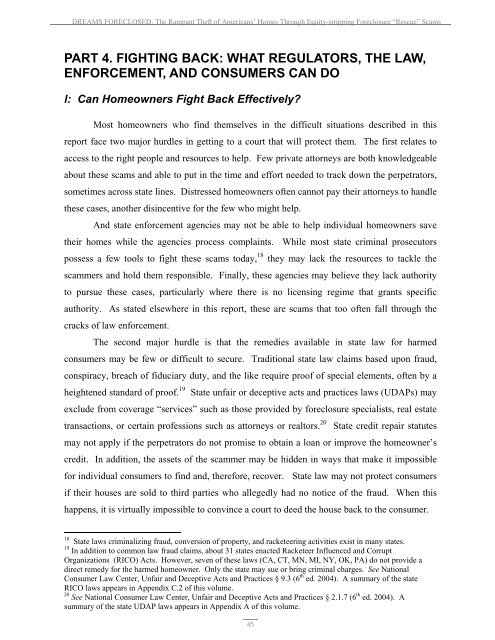DREAMS FORECLOSED: The Rampant Theft of Americans' Homes
DREAMS FORECLOSED: The Rampant Theft of Americans' Homes
DREAMS FORECLOSED: The Rampant Theft of Americans' Homes
You also want an ePaper? Increase the reach of your titles
YUMPU automatically turns print PDFs into web optimized ePapers that Google loves.
<strong>DREAMS</strong> <strong>FORECLOSED</strong>: <strong>The</strong> <strong>Rampant</strong> <strong>The</strong>ft <strong>of</strong> Americans’ <strong>Homes</strong> Through Equity-stripping Foreclosure “Rescue” Scams<br />
PART 4. FIGHTING BACK: WHAT REGULATORS, THE LAW,<br />
ENFORCEMENT, AND CONSUMERS CAN DO<br />
l: Can Homeowners Fight Back Effectively<br />
Most homeowners who find themselves in the difficult situations described in this<br />
report face two major hurdles in getting to a court that will protect them. <strong>The</strong> first relates to<br />
access to the right people and resources to help. Few private attorneys are both knowledgeable<br />
about these scams and able to put in the time and effort needed to track down the perpetrators,<br />
sometimes across state lines. Distressed homeowners <strong>of</strong>ten cannot pay their attorneys to handle<br />
these cases, another disincentive for the few who might help.<br />
And state enforcement agencies may not be able to help individual homeowners save<br />
their homes while the agencies process complaints. While most state criminal prosecutors<br />
possess a few tools to fight these scams today, 18 they may lack the resources to tackle the<br />
scammers and hold them responsible. Finally, these agencies may believe they lack authority<br />
to pursue these cases, particularly where there is no licensing regime that grants specific<br />
authority. As stated elsewhere in this report, these are scams that too <strong>of</strong>ten fall through the<br />
cracks <strong>of</strong> law enforcement.<br />
<strong>The</strong> second major hurdle is that the remedies available in state law for harmed<br />
consumers may be few or difficult to secure. Traditional state law claims based upon fraud,<br />
conspiracy, breach <strong>of</strong> fiduciary duty, and the like require pro<strong>of</strong> <strong>of</strong> special elements, <strong>of</strong>ten by a<br />
heightened standard <strong>of</strong> pro<strong>of</strong>. 19<br />
State unfair or deceptive acts and practices laws (UDAPs) may<br />
exclude from coverage “services” such as those provided by foreclosure specialists, real estate<br />
transactions, or certain pr<strong>of</strong>essions such as attorneys or realtors. 20<br />
State credit repair statutes<br />
may not apply if the perpetrators do not promise to obtain a loan or improve the homeowner’s<br />
credit. In addition, the assets <strong>of</strong> the scammer may be hidden in ways that make it impossible<br />
for individual consumers to find and, therefore, recover. State law may not protect consumers<br />
if their houses are sold to third parties who allegedly had no notice <strong>of</strong> the fraud. When this<br />
happens, it is virtually impossible to convince a court to deed the house back to the consumer.<br />
18 State laws criminalizing fraud, conversion <strong>of</strong> property, and racketeering activities exist in many states.<br />
19 In addition to common law fraud claims, about 31 states enacted Racketeer Influenced and Corrupt<br />
Organizations (RICO) Acts. However, seven <strong>of</strong> these laws (CA, CT, MN, MI, NY, OK, PA) do not provide a<br />
direct remedy for the harmed homeowner. Only the state may sue or bring criminal charges. See National<br />
Consumer Law Center, Unfair and Deceptive Acts and Practices § 9.3 (6 th ed. 2004). A summary <strong>of</strong> the state<br />
RICO laws appears in Appendix C.2 <strong>of</strong> this volume.<br />
20 See National Consumer Law Center, Unfair and Deceptive Acts and Practices § 2.1.7 (6 th ed. 2004). A<br />
summary <strong>of</strong> the state UDAP laws appears in Appendix A <strong>of</strong> this volume.<br />
45



